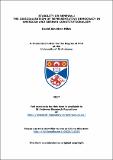Stability or renewal : the judicialisation of representative democracy in American and German constitutionalism
Abstract
This thesis examines how American and German constitutionalism, as shaped by the U.S. Supreme Court and the German Constitutional Court (Bundesverfassungsgericht), have mediated the tension between threats to stability and the imperative of renewal through occasional or constant interventions in their democratic processes. To do this, it primarily assesses the 1960s U.S. reapportionment cases and the European Parliament electoral threshold cases of 2011 and 2014. It also considers the ideas of four thinkers, theorists and jurists who have wrestled with the dilemma of how to maintain the bond between citizen and state: Ernst-Wolfgang Böckenförde, Hannah Arendt, Thomas Jefferson and Alexis de Tocqueville.
Stability and renewal represent the twin orientation points for constitutionalism and the courts against which they must adjust to possible democratic threats, or new political and social forces in need of recognition. Threats to the state can emerge either from a surfeit of illiberal views in politics and society aimed at destroying an existing constitutional order, or when democratic channels become starved of new opinions through the constitutional or unconstitutional exclusion of voters and parties.
A distinctive feature of the approach taken is the conceptual division between the ‘legal/institutional’ space in which the Supreme Court and Bundesverfassungsgericht interpret constitutional meaning, and the ‘civic space’ in which citizens accept or reject constitutional meaning. One central question is how American and German constitutionalism, and the U.S. Supreme Court and Bundesverfassungsgericht shape and influence the vital civic space that is integral to the democratic relationship between citizen and state, and the survival of the state itself. Ultimately it is concluded that without acceptance of the importance of law and constitutionalism by citizens in the civic space, the influence of the Supreme Court and the Bundesverfassungsgericht becomes purely institutional and effectively consigned to the courtroom.
Type
Thesis, PhD Doctor of Philosophy
Collections
Items in the St Andrews Research Repository are protected by copyright, with all rights reserved, unless otherwise indicated.
Related items
Showing items related by title, author, creator and subject.
-
Constituting and regulating democracy : Kenya’s electoral commission and the Courts in the 2010s
Stacey, Richard; Miyandazi, Victoria (2021-12) - Journal articleIn August 2017, responding to a petition from the losing candidate in the presidential election held days before, the Supreme Court of Kenya declared the results of the election null and void. Dramatic in itself, the ... -
Poland's minorities in the transition from Soviet-dominated ethnic nation-state to democratic civic nation-state
Kamusella, Tomasz (2003-12-01) - Journal item -
Globalization, democratization, and the Arab uprising : the international factor in MENA's failed democratization
Hinnebusch, Raymond (2015) - Journal articleWhat explains the almost negative impact of international factors on post-Uprising democratization prospects? This article compares the utility of rival “diffusionist” and neo-Gramscian political economy frames to explain ...

